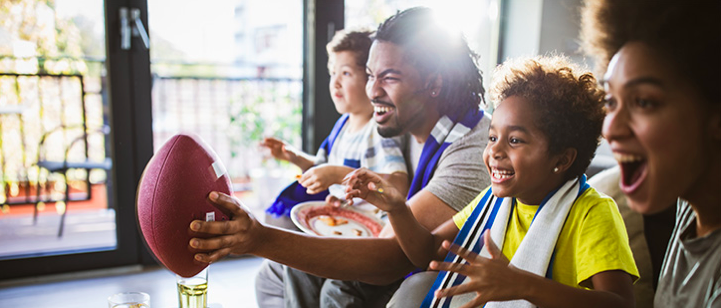For the first time in history the National Football League (NFL) is broadcasting the 2020 Draft fully virtual as a result of implementing safety precautions during the COVID-19 pandemic. The families of these professional prospects are opening their homes for the world to join them in a life changing celebration. While this has been a joyous time for the families and the players, it has not been without viral moments of some out of context family moments. As each family partakes in this process there are some key ways to support the players. In the age of social media where every moment is recorded on camera, it can be important to establish some best practices so that these untimely moments can be limited and ultimately keep the focus on the player.
Each family has a unique set of dynamics. This year’s draft included a multitude of family stories, some of survival, grief, perseverance, hope and love. Draft day is a once in a lifetime opportunity for young NFL prospects to finally see all of their hard work come to fruition. Family dynamics can either interfere with or enhance the experience of draft day. The roles of each person in the support network should match with the expectations of the players. Many times players are mentally focused on the day just as they would be in a live game situation. This can be an overwhelming time because of internal and external pressure to achieve a new status which can be demanding on a player’s mental health. It is the responsibility of the family to show support by representing themselves and the brand in a meaningful & considerate way. The NFL is a highly publicized entity that can be tricky to navigate for family members who are also having to adapt to being on a major platform. Here are some considerations for families of prospective players.
1. Draft Day is About the Player
Becoming a contender in the NFL draft is definitely a team effort that occurs on and off the field. The family makes up the home team. While others may feel responsible in many ways for the player’s success, the player was ultimately the one that had to put in enough work to produce the results. Allow them the opportunity to enjoy their day. As Jay-Z once said, “no one wins when the family feuds.” This is probably not the best time to try to handle any unresolved family conflicts or occupy space in front of the camera that essentially blocks the player from view. A suggestion to assist with this would be to try asking the player how he can feel best supported by you during this time.
2. Consider Proximity to the Player
Immediate family is more likely to share time with the player on this day. There may be special circumstances in which a player may consider other influential people in his life immediate family because of the bond. If you do not identify with this description it does not mean you are not important, it may just mean that your role will look different. The players need those that are sharing in this moment to have their back. Sometimes the best way to show support is to take a back seat. If you are a girlfriend or a friend, checking in with his mom on where she would like everyone’s seats arranged provides some insight that may prevent confusion once the cameras start rolling.
3. Attire Reflects Effort
When in doubt, wear neutral. Any of the 32 teams could draft your family member. The team that drafts him might not be your favorite team…it may not be his either…but do not make the moment awkward by wearing paraphernalia from any sports team in any league. Even if it is a different sport, such as basketball, others observing the family may take that as repping a specific city even if that is not your intention. It is okay to be expressive and have style. Consider if what you are wearing, or lack thereof, is a distraction. Listen to your conscience. If there is any doubt, it may be better to wear a different outfit.
Family dynamics on draft day is an important area that is worth addressing. There are supports in place for families of the new professional athletes once the draft is over, but preventative care can also be helpful. Do not be afraid to contact other families that have lived through the same experience. If you or someone you know is experiencing symptoms of anxiety and confusion surrounding draft day, it is okay to talk to someone about it. The considerations listed above are not limited to the NFL draft. These tips can be applied to other sports drafts. When draft day comes around, which is arguably the biggest moment in a young player’s life, supportive family dynamics should be something he can count on.


